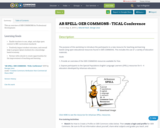
This an overview of OER COMMONS for Professional Development.
- Subject:
- Arts and Humanities
- Business and Communication
- Mathematics
- Social Science
- Material Type:
- Teaching/Learning Strategy
- Date Added:
- 09/20/2013

This an overview of OER COMMONS for Professional Development.

Middle and High School educators across Lebanon County, Pennsylvania developed lesson plans to integrate the Pennsylvania Career Education and Work Standards with the content they teach. This work was made possible through a partnership between the South Central PA Workforce Investment Board (SCPa Works) and Lancaster-Lebanon Intermediate Unit 13 (IU13) and was funded by a Teacher in the Workplace Grant Award from the Pennsylvania Department of Labor and Industry. This lesson plan was developed by one of the talented educators who participated in this project during the 2019-2020 school year.
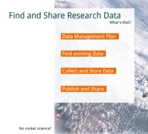
The toolkit addresses research data management, a topic that is a burden for many in the research routine. However, there is a lot in it for researchers, if they document, backup, and eventually share their research data. It can get cited and will influence their metrics. Also, many journals and third party funders require the publication of research data – for the sake of transparency, quality control and synergy effects in research. In this toolkit, researchers can find materials and information on managing their own data – but also search portals, in which they can find high quality research data themselves.
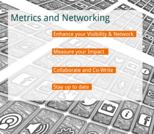
Being active in social media, like in Twitter and Blogs, is one way to reach a larger audience and to enhance a researcher’s impact. Other researchers will learn about their findings through these additional channels and in addition the public, policy makers, and the press. The toolkit shows several ways of how to get in touch with other researchers and discuss findings at an early stage in research networks, conferences, and in social media. It presents open tools for co-writing, online meetings, reference- and project management.
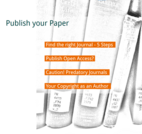
The aim of this toolkit is to support early career researchers in finding a journal that publishes their paper and optimally promotes the visibility of their research. How can they find a journal with a good journal ranking score that is perceived in the respective research community? How can they find a journal that perfectly matches their topic? Should they consider publishing open access? What are predatory journals and how can they detect them?
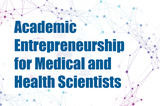
How do I use this resource?
Join our community by creating a free and safe PubPub Account:
https://academicentrepreneurship.pubpub.org/resources
Then, participate in this dynamic eBook and community. Update, annotate, comment, download, upload videos and podcasts and share chapters to your own digital spaces and networks.
Academic Entrepreneurship for Medical and Health Scientists, is a free open education resource that can be used asynchronously in courses, workshops, pilot grant programs, and by individuals.
Who is an academic entrepreneur?
Faculty, staff, or students turning observations in the laboratory, clinic, and community into interventions that improve the health of individuals and the public and seeking to:
- patent and/or license their work
- spin-out or spin-in ventures based on evidence
- collaborate with industry to realize impact
5 Primary Domains: Over 500 pages of content
- Academia
- People
- Ideation
- IP/Regulation
- Finance
How do I use this book at my institution?
If you identify faculty teaching biomedical entrepreneurship at your institution (classes, workshops, etc.), we can reach out, assist with suggesting chapters relevant to their syllabus if interested, and provide optional tracking data so they can view their students’ access/use of the material. Contact us! https://www.med.upenn.edu/apps/faculty/index.php/g275/p12240
I want to contribute!
This is a living e-book which is publicly available and licensed with creative commons. It has potential for frequent updates and we welcome contributions from new authors. Contact us! https://www.med.upenn.edu/apps/faculty/index.php/g275/p12240
Other Formats:
Are you a visual learner? Try our interactive Prezi: https://www.bit.ly/AcadEnt

Be sure to reflect on your accomplishments and areas of growth!
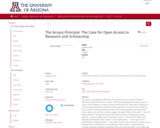
Questions about access to scholarship go back farther than recent debates over subscription prices, rights, and electronic archives suggest. The great libraries of the past—from the fabled collection at Alexandria to the early public libraries of nineteenth-century America—stood as arguments for increasing access. In The Access Principle, John Willinsky describes the latest chapter in this ongoing story—online open access publishing by scholarly journals—and makes a case for open access as a public good.
A commitment to scholarly work, writes Willinsky, carries with it a responsibility to circulate that work as widely as possible: this is the access principle. In the digital age, that responsibility includes exploring new publishing technologies and economic models to improve access to scholarly work. Wide circulation adds value to published work; it is a significant aspect of its claim to be knowledge. The right to know and the right to be known are inextricably mixed. Open access, argues Willinsky, can benefit both a researcher-author working at the best-equipped lab at a leading research university and a teacher struggling to find resources in an impoverished high school.
Willinsky describes different types of access—the New England Journal of Medicine, for example, grants open access to issues six months after initial publication, and First Monday forgoes a print edition and makes its contents immediately accessible at no cost. He discusses the contradictions of copyright law, the reading of research, and the economic viability of open access. He also considers broader themes of public access to knowledge, human rights issues, lessons from publishing history, and "epistemological vanities." The debate over open access, writes Willinsky, raises crucial questions about the place of scholarly work in a larger world—and about the future of knowledge.
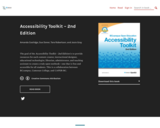
The goal of this accessibility toolkit, 2nd edition, is to provide resources for each content creator, instructional designer, educational technologist, librarian, administrator, and teaching assistant to create a truly open textbook—one that is free and accessible for all students. This is a collaboration between BCcampus, Camosun College, and CAPER-BC.
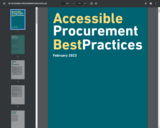
This best practice report pertains to exploring the challenges and processes surrounding to support organizations in promoting inclusion through ICT by ensuring the procurement of accessible platforms that will support the access needs of PWD within the environment.
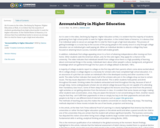
As it is seen in the video, Declining by Degrees: Higher Education at Risk, it is evident that the majority of students graduating from high school prefer to seek for higher education. In the United States of America, it is obvious that if an individual seeks to secure an average life it is vital for them to get a high level education.

A wiki textbook collaboratively authored in two main sections: financial accounting and managerial accounting.
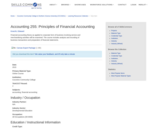
Financial accounting theory as applied to corporate form of business involving service and merchandising activities will be examined. The course includes analysis and recording of business transactions and preparation of financial statements.
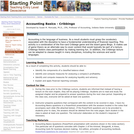
Help students grasp accounting basics, the language of business, by playing Cribbingo.
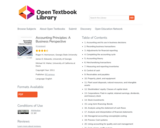
Uses annual reports of real companies to illustrate many of the accounting concepts in use in business today. Gaining an understanding of accounting terminology and concepts, however, is not enough to ensure your success. You also need to be able to find information on the Internet, analyze various business situations, work effectively as a member of a team, and communicate your ideas clearly. This text was developed to help you develop these skills.
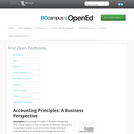
Accounting Principles: A Business Perspective uses annual reports of real companies to illustrate many of the accounting concepts in use in business today. Gaining an understanding of accounting terminology and concepts, however, is not enough to ensure your success. You also need to be able to find information on the Internet, analyze various business situations, work effectively as a member of a team, and communicate your ideas clearly. This text was developed to help you develop these skills.
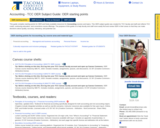
This guide compiles starting points for OER and freely available resources for Accounting courses and topics. This OER subject guide was created for TCC faculty and staff and reflects TCC credit, continuing education, and corrections course offerings. The purpose of this guide is to help faculty and staff more easily find and review OER in their areas so that they can make decisions about quality, accuracy, relevancy, and potential use.
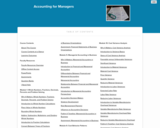
Students learn the basic accounting principles needed to effectively make business decisions as a manager. The course begins with a review of basic math and accounting principles, ensuring students are prepared for the material that follows. Students will learn how to make financial decisions, including decisions around budgeting, financial statements, and cost and profit analysis.
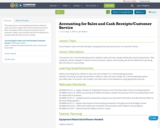
Transactions for a merchandising business related to sales and cash receipts will be discussed and practiced. New vocabulary will be reviewed. Customer service scenarios, videos, and role play will also be addressed to go along with this lesson in accounting.
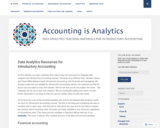
Materials that make it easy for instructors to integrate data analytics into introductory accounting classes, including cases that are suitable for introductory accounting classes.